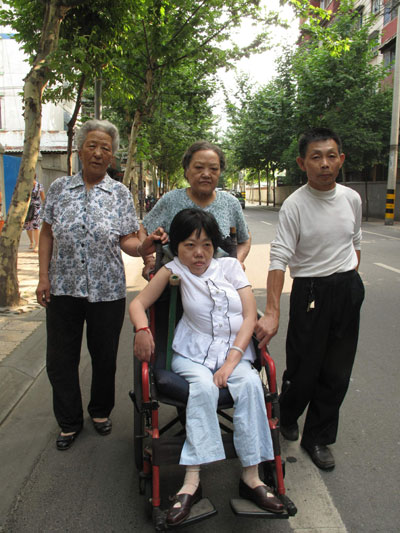Cao Wenying, who has been paralyzed since she was 4 months old, turns her hopelessness into strength to help others in need through a life hotline. She tells Huang Zhiling her story in Chengdu.
|
 |
| Cao Wenying, who is paralyzed and has weak hands, answers a call with her mother Liu Suyun's help. Photos by Huang Zhiling / China Daily |
Cao Wenying almost ended her life at 20. She was paralyzed at 4 months old because of polio. At 20, a doctor confirmed that she would never be cured of her physical disability. She felt hopeless. But today, at 50, she runs a life hotline, like the Befrienders, at her home in Chengdu, capital of Sichuan province, to encourage those in need.
"Everyday, I receive between 20 and 50 calls. Some would even call late at night and disturb my husband's sleep," Cao says.
Callers approach her with all kinds of problems - from men who want to commit suicide because their girlfriends left them to college students, who hate studying because they don't think they can find jobs after graduation.
"Once, I received a call from a rural woman who wanted to die because of poverty and another call from a 70-year-old professor at Sichuan University who felt hopeless because he had no family and was desperately lonely," she says.
Since the hotline started operation, Cao has received more than 10,000 calls.
Sometimes she receives so many calls day and night that she doesn't get any break in between.
Her parents, both 85, would relieve her commitment during the day, and her husband Yao Shuangquan, who works as a traffic assistant during the day, would help her during the nights.
|
 |
| Cao Wenying's mother Liu Suyun (center in the back) and Cao's husband Yao Shuangquan take Cao to a supermarket in Chengdu on Tuesday when Cao's aunt Liu Sugui visits the family. |
Born in Luzhou, Sichuan province, Cao and her sister Cao Wenjun, who also contracted polio and became paralyzed at age 1, never went to school.
A retired teacher from the Ningxia Hui autonomous region taught them pinyin for 20 days.
"Thanks to pinyin and a Chinese dictionary, my younger sister and I self-studied from primary school through college," Cao says.
She tells her story at her sparsely furnished home in an old residential building in downtown Chengdu.
She and her younger sister finished reading all the literary books in the library of the Sichuan Provincial Department of Chemical Industry where their father worked. After reading the Chinese version of Jane Eyre, Cao started self-learned English so that she could read English-language publications.
"We became depressed when our peers passed the national college entrance examination," Cao says.
To add to their distress, they were told by a doctor that there was no cure for their disease.
"We wept all night because we could not move. We didn't even have the ability to buy pesticides to kill ourselves," Cao says.
Their parents requested their friends comfort the sisters and managed to talk them out of their desire to die.
Life took an about turn in 1995 when they took part in an essay competition, organized by the Chengdu Evening News. The topic was on how people with disabilities should never give up. The Caos' essay won second prize and their story was published in the papers.
Letters came flooding in from readers who face difficulties in their lives. As Cao's hands are weak, her younger sister would reply to those letters.
In 1999, a 30-year-old disabled man from Chongqing municipality wrote to them because he was depressed without a job or a wife.
"In his letter, he said he would kill himself if he didn't receive our reply within three days. Our letter reached him after the deadline, and he killed himself," Cao says. The shocking case prompted Cao's family to borrow money to install a telephone at home for easier accessibility.
That was the start of their life hotline, and the rest was history.
The sisters even found their better halves through the hotline.
Both their husbands called the hotline after reading about the service. Cao Wenjun met her husband in 2001, while her elder sister got to know hers in 2002.
In 2003, the two sisters tied the knot while in their wheelchairs, causing quite a sensation in Chengdu.
Cao Wenjun's joy was shortlived. She died in 2005 of heart failure and breathing difficulties. Before her death, she made the senior Cao promise to continue the hotline, no matter the difficulties she faced.
When the family, supported with the pension of Cao's father and the meager monthly income of her husband, couldn't afford the phone bill earlier this year, the Sichuan branch of China Mobile donated a phone for the life hotline. The telecommunication company also gave Cao a toll-free line.
Cao plans to participate in the CCTV 3 program Marching on Happiness, which tells the stories of common people pursuing happiness in life.
"I want to tell my story and show my gratitude to my parents and kindhearted people who have made my life meaningful," she says.
Contact the writer at huangzhiling@chinadaily.com.cn.
|
 |
